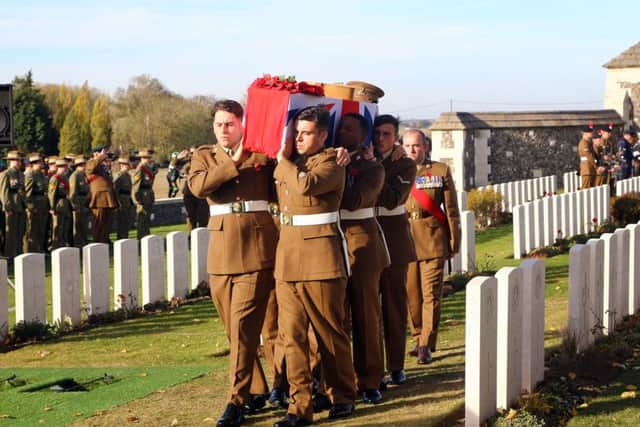Full military honours for unknown soldier
and live on Freeview channel 276
The body of the unknown man, who served in the Lancashire Fusiliers regiment, was buried alongside two Australian soldiers on Tuesday afternoon in Ypres, Belgium.
A ceremony at the Commonwealth War Graves Commission Tyne Cot cemetery was attended by dignitaries, representatives from the regiment and members of the public. The British soldier’s coffin was draped in a Union flag with a wreath of poppies laid on top alongside a belt and hat of the regiment.
Advertisement
Hide AdAdvertisement
Hide AdAfter hymns, prayers and music, readings were given by dignitaries and a firing salute was conducted by the Royal Regiment and the Australian Army as the coffins were interred.


Research suggests the British soldier may have been killed on October 9, 1917, when he was aged between 23 and 29 while fighting in the Battle of Passchendaele which took place 101 years ago between July and November 1917.
The bodies of the three comrades were found lying side-by-side in what is thought to be a shell hole in May 2016 when water works were carried out on Vijfwegestraat, a road near the cemetery.
A pencil engraved with the name of Eagley Cricket Club, near Bolton, was found next to the British soldier alongside epaulettes of the regiment, service buttons, a belt, boots, fragments of a winter coat and a pipe.
Advertisement
Hide AdAdvertisement
Hide AdEach year the remains of around 40 British soldiers who died in the First World War are found on battlefields in Europe and the Ministry of Defence’s Joint Casualty and Compassionate Centre (JCCC) – which is based at the cemetery and organised the ceremony – tries to identify them.
Tracey Bowers, of the JCCC, said the pencil was a “unique” find which alongside the shoulder titles suggested his links to Lancashire. But despite extensive investigations looking into the history of the regiment, battalion war diaries, cricket club records and DNA, his identity has never been confirmed.
Ms Bowers said: “With the centenary of the end of the First World War coming up...it is only right and proper that we try and give these brave soldiers their name on their headstone.”